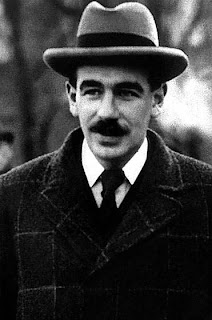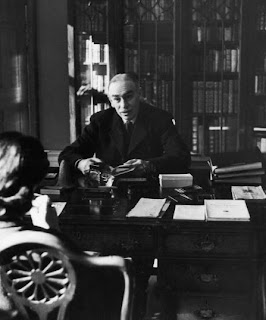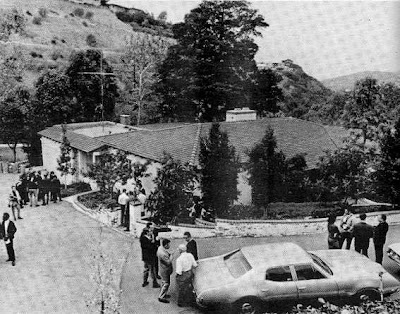
Keynes (1883-1946) was never a closeted homosexual, although his colleagues at Bretton Woods in 1945 didn't always realise it, perhaps because at those conferences he was accompanied by the Russian ballerina Lydia Lopokova, his wife of twenty years. By then he was the eminent economist and statesman, and possibly no longer on the prowl. In earlier days, though, from 1901 to 1915 when he was mostly a 20-something, he cruised constantly and kept two sex diaries of his success. Luckily Keynes was a pack-rat, so we have both of these documents, among a mass of J.M. Keynes memorabilia housed in the modern archives at King's College, Cambridge, (They are reproduced in
Keynes : An Economist's Biography, by D. E. Moggridge, albeit in an appendix labelled "
A Key for the Prurient.") Keynes obsessively counted and tabulated almost everything ; it was a life-long habit. As a child, he counted the number of front steps of every house on his street. Later he kept a running record (not surprisingly) of his expenses and his golf scores. He also counted and tabulated his sex life.

The first diary is easy : Keynes lists his sexual partners, either by their initials (GLS for Lytton Strachey, DG for Duncan Grant) or their nicknames ("Tressider," for J. T. Sheppard, the King's College Provost). When he apparently had a quick, anonymous hook-up, he listed that sex partner generically: "16-year-old under Etna" and "Lift boy of Vauxhall" in 1911, for instance, and "Jew boy," in 1912. This list, where he names names but gives no details, Keynes organised year-by-year. He was scrupulously honest, too, even in times of sexual famine. For three years running — 1903 to 1905 — he records no sexual partners ; ‘nil,' he admitted. As he became older, though, the number of his partners increased dramatically, so that for 1911 he lists eight partners (although half of these are probably one-time pick-ups), for 1915 he lists seven, and for 1913 (his highest score) he lists nine different partners. One or two men are repeaters : DG (Duncan Grant), for example, runs throughout.
The other sex diary is more puzzling and, in a way, more informative. An economist to the core, Keynes organized the second sex diary also year-by-year, but this time in quarterly increments. Unfortunately for us, however, this second sex diary is in code. And as far as I know, no one yet has been prurient enough to crack it. Here's what Keynes' tabulation looks like. For every quarter-year from 1906 to 1915, he tallies up his sexual activities and totals them under three categories: C, A, and W.

For each of these headings, he records the number of times each activity occurred, and also when. For example, between May and August, 1911, he performed (if that's the right word) C 16 times, A four times, and W five times. Whenever I have had the chance [...] I have asked people to free associate to Keynes' code.
When presented with "A" they invariable said "ass", which is almost undoubtedly right, but it leaves open the question of who/whom. Is it giving or receiving? The legal term for anal intercourse (vaguely defined) is
per anum, and in Keynes' day it could get you thrown in jail with hard labour, as happened to Oscar Wilde in 1895 when, to his surprise and eventual devastation, he was put away for two years. So Keynes, understandably, is taking care in this diary to hide his activity. As for "W", everyone says right away, "wanking," or masturbating. The problem with this decoding is that one would expect the numbers for W to be the highest (how sexually active could Keynes possibly have been?), but in fact the totals for W are the lowest for the three categories. Surprisingly, for several quarters, W happened zero times. So either Keynes didn't bother to masturbate, or he didn't need to because his other numbers are so high.

The tricky one is C. What springs to mind (well, to my mind) is "copulation," or "cop" as Keynes would have said, but copulation is a very vague term (again, who/whom, and exactly how does this work?). In 1920s London the word did not necessarily always mean sexual intercourse of any variety (as we use it today) but could suggest only a kiss on the cheek (I beg your pardon, not that cheek) or a quick squeeze. In fact any flirtation beyond mere suggestive banter could come under the heading of "cop." [Another] suggested "cock-sucking", but while an appealing idea, I think it's rather less likely than the more generalised (and flirtatious) "cop." For one thing, according to Keynes' tabulation, what he did most frequently and consistently was C. It happened 17 times from May to August of 1908, 28 times (!) from August to November that year, 20 times from February to May of 1909, and so on. That's a lot of C. The high numbers for C loosely (but not consistently) correlate to university holidays, the break at Easter and the longer summer holiday, when Keynes would have had more leisure to pursue and enjoy his bouts of C. C therefore could be a general act — "cop" — a sweet time, maybe a kiss, maybe a little more, with a hoped-for return on investment. C could also stand for "cruising." Or even "cottaging," looking for sex in a public bathroom. Lest you think that "cruising" and "cottaging" are merely recent terms, may I suggest you brush up on your Polari?

Polari, or
The Lost Language of Gay Men as Paul Baker has it in his wonderfully readable lexicon of that name, is the secret parlance through which gay men secretly communicated with each other during most of the 20th century. According to a recent article in the
Guardian ("
What brings you trolling back, then?" by Colin Richardson), it flourished between Oscar Wilde's trial in 1895 and the decriminalisation of homosexuality (in England) in 1967. Polari-speak is not so much "lost" now, as part of our common culture—witness "cruising", "cottaging", and even the most basic gay word, "camp". By the way, the next time you "cold-call" someone, looking for a positive outcome, you are speaking Polari.
If C is cruising, this could also account for the high numbers : Keynes, like other Englishmen of his time, was a big walker, and Cambridge is a grand place to walk, as is the countryside around it. London, too, is a walkable city, and, according to Matt Cook in his
London and the Culture of Homosexuality, 1885-1914, a city dotted in Keynes' day with a vast number of known pick-up spots. Green Park, for example, was heavily trafficked, as were Oxford Street, Piccadilly Circus, Regent Street, Leicester Square, and, if you were well-educated and preferred to be indoors, the British Museum.

But because "A" and "W" are most likely specific acts, not general ones, it's tempting to side with the Church historian and go with "cock" (sucking, or whatever). But I think I'll hedge here and choose "cop," which can include cock-sucking but could also just be kissing and fondling. Don't forget — Keynes did a lot of C ; it's consistently his highest number.
Would Keynes have known these terms? ("Cock", by the way, doesn't turn up in the Polari lexicon, maybe because it was a common obscenity, not limited to gay men.)
It depends on how cutting-edge he was, how hip. I suspect he did know, because Keynes knew practically everything. He also was notoriously "naughty" in speech, sharing a love of obscenity with his best friend (until Lydia), Virginia Woolf's sister, the painter Vanessa Bell.
My further guess is that this coded list has nothing to do with the specifically named lovers recorded on the first list but instead records only anonymous sex, and that therefore C, with its high tally, is something that happened easily, often and surreptitiously. Why keep a lengthy, specific tally, indexed by activity, if you're doing "it" every day anyway with the same person? If most days you have a bit A and you don't have to resort to W, why bother to note it? Not interesting. It makes more sense, as I see it, to keep a list of how often and under what circumstances you could possibly have sex, and then how often you scored. Seeking anonymous sex would be sort of like investing in the stock market (which Keynes did obsessively, trading daily before he even got out of bed) : invest often, hedge and maximise your chances, hope for the best.

To buttress my theory that this second tabulated diary records anonymous sex (or attempts at anonymous sex), and not on-going sex with a stable partner, there is another, very puzzling number attached to each quarterly increment. First, Keynes adds up all the three categories of activities — "C" plus "A" plus "W" — and then he attaches a number that doesn't seem to relate to any of them. These numbers range from 65 to 100. Doesn't that sound to you like a grade ?
Keynes was a young don, barely out of university, so my guess is that he's grading himself on performance. Most of his grades (if that's what they are) are in the 70s and 80s. That is, he attained pretty good sex but nothing to write home about. Only rarely does he award himself a grade of 95 or above (no grade-inflation here), but there is a 100 and there's even one 104. That 104 either disproves my theory or indicates a quarter-term of quite spectacular A+ sex.
What we do know is that, in the years Keynes was lecturing on economics at Cambridge, writing "
Indian Currency and Finance", working on the book that later became "
A Treatise on Probability", advising the Treasury in the run-up to the first world war, and (all this according to Robert Skidelsky, Keynes' principal biographer) speculating enthusiastically in the stock market, he had much more than a so-called life. You might say that Keynes was at least as invested in the sex market as the stock market.
sources :
http://moreintelligentlife.com/node/824http://www.guardian.co.uk/comment/story/0,3604,1391811,00.html
 "[...] On November 7 1938, Herschel Grynszpan, a Jew, walked into the German embassy in Paris and shot Ernst vom Rath, a German diplomat, five times. Vom Rath died two days later. Nazi propagandists condemned the shooting as a terrorist attack to further the cause of the Jewish "world revolution", and the pogrom was launched. The attacks - called Kristallnacht [...] - led to the murder of 91 Jews, the arrests of 26,000 others and the destruction of 177 synagogues.
"[...] On November 7 1938, Herschel Grynszpan, a Jew, walked into the German embassy in Paris and shot Ernst vom Rath, a German diplomat, five times. Vom Rath died two days later. Nazi propagandists condemned the shooting as a terrorist attack to further the cause of the Jewish "world revolution", and the pogrom was launched. The attacks - called Kristallnacht [...] - led to the murder of 91 Jews, the arrests of 26,000 others and the destruction of 177 synagogues. When Vom Rath went back on his word, Grynszpan reacted by storming into the German embassy on rue de Lille 78, demanding to see him, and opening fire on him with a revolver. Grynszpan was arrested and languished in jail in France until 1940, when he was handed over to the Nazis, who planned a show trial which would be used to justify the outbreak of the second world war. A combined report from the German foreign, justice and propaganda ministries in January 1942 declared : "The purpose of the trial should be to clarify to the German people and the world that the international community of Jews is to blame for the outbreak of this war."
When Vom Rath went back on his word, Grynszpan reacted by storming into the German embassy on rue de Lille 78, demanding to see him, and opening fire on him with a revolver. Grynszpan was arrested and languished in jail in France until 1940, when he was handed over to the Nazis, who planned a show trial which would be used to justify the outbreak of the second world war. A combined report from the German foreign, justice and propaganda ministries in January 1942 declared : "The purpose of the trial should be to clarify to the German people and the world that the international community of Jews is to blame for the outbreak of this war."
 According to Prof Döscher, when Grynszpan learned of this motivation for the trial in the early 40s, he revealed the real truth to his Nazi captors. Fearing embarrassment and humiliation, they then stripped Vom Rath of his martyrdom and scrapped their plans. Grynszpan was sent to Sachsenhausen concentration camp and then disappeared. [...] Prof Döscher gleaned his previously unpublished evidence from court archives, reports from the propaganda ministry, letters, diary extracts, and interviews with diplomats of the time. Most startling are the diaries of Gide, in which the writer expresses his amazement that the scandal failed to gain public attention.
According to Prof Döscher, when Grynszpan learned of this motivation for the trial in the early 40s, he revealed the real truth to his Nazi captors. Fearing embarrassment and humiliation, they then stripped Vom Rath of his martyrdom and scrapped their plans. Grynszpan was sent to Sachsenhausen concentration camp and then disappeared. [...] Prof Döscher gleaned his previously unpublished evidence from court archives, reports from the propaganda ministry, letters, diary extracts, and interviews with diplomats of the time. Most startling are the diaries of Gide, in which the writer expresses his amazement that the scandal failed to gain public attention. Vom Rath, Gide wrote (a), "had an exceptionally intimate relationship with the little Jew, his murderer". Referring to the fact that Vom Rath was both gay and had an affair with a Jew, Gide later said: "The thought that a such highly-thought of representative of the Third Reich sinned twice according to the laws of his country is rather amusing." But that was not what amazed him most. "How is it that the press failed to bring this scandal into the open?" he asked."
Vom Rath, Gide wrote (a), "had an exceptionally intimate relationship with the little Jew, his murderer". Referring to the fact that Vom Rath was both gay and had an affair with a Jew, Gide later said: "The thought that a such highly-thought of representative of the Third Reich sinned twice according to the laws of his country is rather amusing." But that was not what amazed him most. "How is it that the press failed to bring this scandal into the open?" he asked."








































